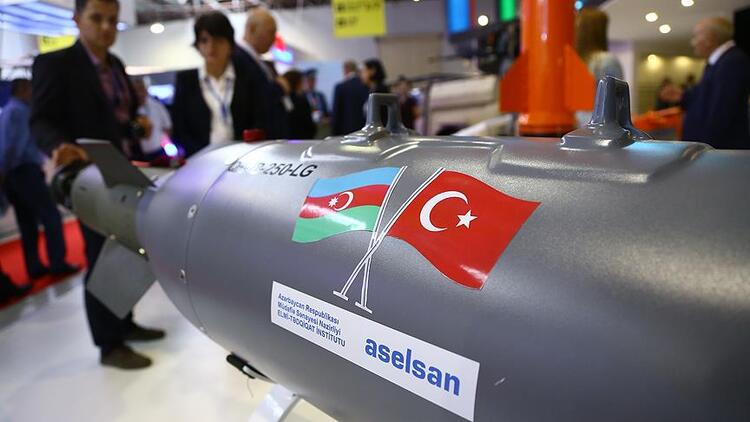Nordic Monitor
Turkish-Azerbaijani bilateral military relations are deepening at time when Azerbaijan has been engaged in a massive effort to modernize and upgrade its military ties.
A Turkey-Azerbaijan defense industry cooperation agreement was approved by the Foreign Affairs Committee of the Turkish parliament in November 2019 and is expected to be ratified by the Turkish parliament this year. Among other countries, Turkey plays a significant role in providing arms and military technology to Azerbaijan, which spent around $2 billion on its defense industry in 2019. The new mechanism will strengthen their already close military ties and boost Turkey’s defense exports to its neighboring partner, Azerbaijan.
According to the text of the agreement, obtained by Nordic Monitor, the mechanism focuses on improving defense industry capabilities through more effective cooperation in the fields of development, production and procurement, and maintenance of military and defense materiel as well as technical and logistical support, information sharing and research in the field.
Azerbaijan is an important market for Turkish defense suppliers, and defense industry cooperation is seen by the Turkish government as a fundamental element of a larger trade framework. In 2019, Turkey and Azerbaijan had a trade volume of nearly $4.5 billion, and their goal is to increase it to $15 billion by 2023.

President Recep Tayyip Erdoğan paid an official visit to Azerbaijan to attend the Turkey-Azerbaijan High Level Cooperation Council, held in Baku on October 31, 2017. Following the meeting the then-Turkish Defense Minister Nurettin Canikli and Azerbaijani Defense Minister Gen. Zakir Hasanov signed the 21-article agreement, which sets out the framework for cooperation in the defense industry, in the presence of President Erdoğan and his counterpart, President Ilham Aliyev. The accord was submitted to parliament for ratification on October 4, 2019 by President Erdoğan.
The agreement states in Article 4 that the parties will provide “appropriate conditions for joint research, development, production and modernization of spare parts, tools, defense materials, military systems, technical displays and technical equipment required by the Armed Forces of the Parties.”
The deal also covers the procurement of defense industry goods and services and the sale of finished military and defense equipment produced through joint projects to third countries as well as technology transfer. Moreover, Article 4 underlines that the parties should focus on “selling, purchasing or exchange, in line with the relevant legislation of the parties, of surplus defence industry products and services,” adding that they will assist each other in the exchange of “scientific and technical information, relevant documents and information on defence industry standards.”
The letter submitted to parliament seeking approval of the agreement with Azerbaijan:
The agreement also aims to promote cooperation between military technical institutions, defense industry companies and maintenance and repair facilities, and to facilitate technical visits to research centers and personnel exchanges between the institutions and companies.
According to Article 7 of the framework agreement, the two sides will form a joint commission to implement the agreement and select projects to be carried out jointly. The joint commission will be responsible for determination and definition of concrete fields of cooperation, selection of joint projects, exchange of information, submission of proposals, recommendations and opinions to the relevant authorities, ensuring the preparation and publication of necessary documents for realization of approved projects and decisions, regular supervision of the project implementation and assessment of the implementation.
The deal also sets forth conditions on the handling of classified information and documents produced or provided under the agreement, specifying how they shall be exchanged, used and protected. “Classified Information, Documents and Commercially Sensitive hardware and software will be transmitted between the Parties through government-to-government diplomatic channels or through other channels agreed by the Competent Security Authorities of the Parties,” Article 9 (10) states.
The terms of the agreement will be executed by the defense ministry on the Turkish side and the defense industry ministry for Azerbaijan. The deal is valid for five years with automatic renewal for successive periods of one year. According to the agreement, either party must notify the other of the intent to terminate at least three months in advance.
The 13-page security agreement is posted below:
While Azerbaijan diversifies its heavy-armament deals from dominant suppliers to European and Asian countries, Turkish defense industry giants are building new partnerships to take advantage of Azerbaijan’s increasing military expenditure.
In 2018, Aselsan, a subsidiary of the Turkish Armed Forces Foundation (TAFF), signed an agreement with its Azerbaijani counterpart on the joint production of communication facilities. Similarly, Turkish Aerospace Industries (TAI), another TAFF subsidiary, inked a cooperation protocol with the Azerbaijan National Academy of Sciences (AMEA) in September 2018 to combine efforts in the fields of defense and aviation.
The same year, the Turkish Mechanical and Chemical Industry Company (MKEK) received a defense cooperation offer from Azerbaijan’s Ministry of Defense Industry, the state-run Anadolu news agency reported. Moreover, Turkey’s Roketsan and Azerbaijani military-scientific enterprise Iglim have been working on developing a long-range missile system since 2009.
TAFF was founded in 1987 to “enhance the combat strength of the Turkish Armed Forces” and has played a leading role in the establishment and development of the defense industry. It directly and indirectly controls major companies such as Aselsan (electronics), Isbir (generators and alternators), Aspilsan (battery pack products), Havelsan (informatics), Roketsan (rockets and missiles) and TAI (aerospace and satellites). In 2018 it earned 43 percent of the Turkish defense industry’s total revenue, while it was responsible for 41 percent of defense exports.
On December 24, 2017 President Erdoğan issued a decree placing the military ruled “foundation” under his control. Today, the TAFF board of trustees, as the main decision-making organ of the foundation, is chaired by Erdoğan.












